Archives
Dorothy Loudon and Annie
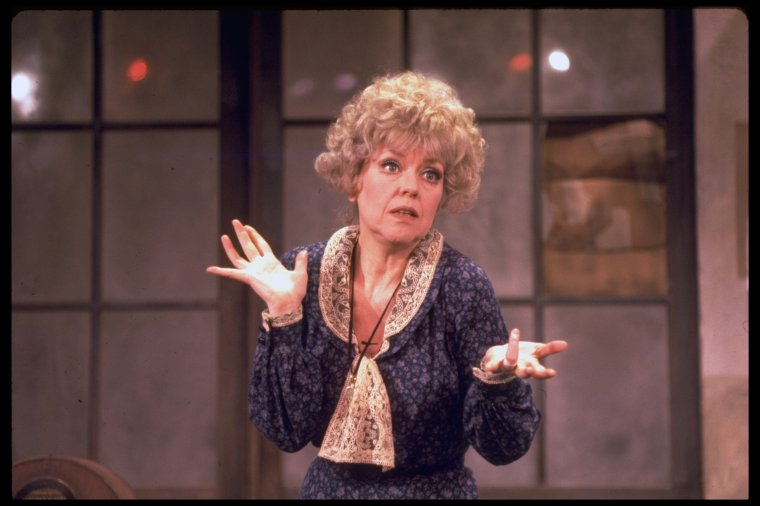
Loudon, by the mid-1970s, had gone into a semi-voluntary semi-retirement. The Women, in 1973, was the last of a half-dozen promising Broadway shows (if you count Lolita, My Love, which never quite made it to New York) that closed in less than three months. She had enjoyed more success touring — Paul Zindel's The Effect of Gamma Rays on Man-in-the-Moon Marigolds, in 1971-1972, had been her favorite stage role — but Loudon was tired of the road, and hated leaving New York.
She turned down television offers that would have taken her to Los Angeles. Increasingly, her focus was on her husband, the composer-arranger Norman Paris, whom she had married in 1971. Loudon plunged into domesticity: cooking, cleaning, sewing, staying home. "I was never so happy in my life," she said of these years, after they were over for good. That was undoubtedly true, although Paris had troubles — health problems, tax problems — that consumed a lot of time and worry.
"Most people think I'm retired — or dead," Loudon told an interviewer in early 1977.
Meanwhile, the show that would become the Broadway juggernaut Annie was taking shape. It was lyricist Martin Charnin's brainchild, and for a long time he was the only one who thought Harold Gray's Little Orphan Annie comic strip would make a great musical. Charnin corralled Thomas Meehan and Charles Strouse to write the book and the music, respectively, even though both men hated the idea at first. Meehan didn't want to write a show like Li'l Abner or You're a Good Man, Charlie Brown. Charnin insisted that Annie wouldn't be a comic-strip musical, but a musical "that simply happened to be based on a comic strip."
It took the Annie trio four years to get the show written and, finally, performed, during the 1976 summer stock season at the Goodspeed Opera House in East Haddam, Connecticut. Charnin's insistence on directing the production himself discouraged many potential backers (and nearly dissuaded Michael Price, the artistic director of the Goodspeed, from taking the orphan Annie in). A bad notice from Walter Kerr in The New York Times seemed to kill the show's chances of transferring from the Goodspeed to a bigger arena. Kristen Vigard, the original Annie, came across as too nice; and Maggie Task's Miss Hannigan was too mean.

"You guys are sitting on a gold mine," Nichols said to Charnin, Strouse, and Meehan after seeing Annie at the Goodspeed. Nichols agreed to produce the show on Broadway (surprisingly, it would be his debut as a theatrical producer) and rounded up the heavyweight investors needed to make it happen. Nichols's own work, particularly in the cinema (Who's Afraid of Virginia Woolf?; Carnal Knowledge), tended toward darkness and cynicism. But, somehow, "the whole Annie experience has humanized Mike," explained Charnin. "He cries at the show sometimes."
Although Nichols was a hands-on producer, mediating disputes and offering vital notes during rehearsals and previews, the rumors that he was poised to take over for Charnin were apparently unfounded. Strouse, in his memoirs, insisted that Annie was directed entirely by Charnin. Nichols downplayed his creative contributions, but there were two elements for which he would accept credit: a major reworking of the sets, and the recasting of Miss Hannigan, the cruel orphanage matron who is the show's primary villain.
An odd couple, Nichols and Dorothy Loudon had crossed paths at several key points in their careers. She had shared a bill with Nichols and Elaine May, his partner in a hugely popular comedy act, at the Manhattan supper club The Blue Angel. In 1959, the three of them had appeared together (along with Dick Van Dyke, Shelley Berman, and Orson Bean!) on a short-lived live television panel show called Laugh Line. Then, as Loudon later noted ruefully, she stayed on at The Blue Angel — "like a faucet" — while Nichols entered the stratosphere. But Nichols didn't forget her. In 1962 he cast her in her first legitimate stage production, an Off-Broadway venture called The World of Jules Feiffer, which never quite cohered. Three years later Loudon appeared in the road company of Murray Schisgal's Luv, which Nichols had staged on Broadway. Although the touring production was directed by Jack Sydow, Nichols saw it in Los Angeles and told Loudon that "you did all the things with this part that I have ached to see — and never got .... We think alike."
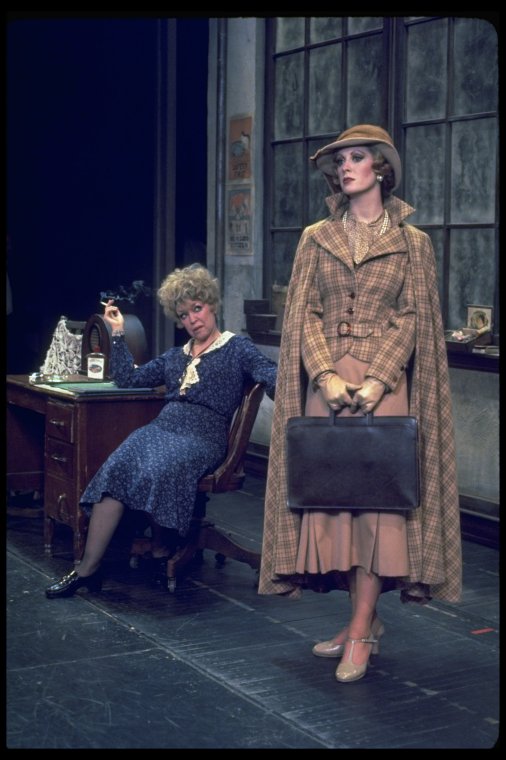
Loudon, who always claimed she was never anyone's first choice for any role, had to audition twice before the other producers were convinced. But Nichols's instincts were right: she won the role. Still unsure about whether to do the show, Loudon turned to her husband for advice. He told her to take the part. "I said to Norman, 'I don't want to play some gnarled, nasty old dame, I want to play someone young and terrific!'" Loudon recalled. "But he said to me there's nothing funnier than a nasty old gal surrounded by a lot of kids, and he was right."
(In his 1977 book about the making of Annie, Martin Charnin wrote that he had thought of Loudon as Miss Hannigan as early as 1972. But Loudon herself always gave the credit to Nichols.)
Loudon's epiphany was to humanize Miss Hannigan, and to add a strong element of humor to a character who had been played straight at the Goodspeed. "Look, the only reason she's so mean to those orphans is she knows they have a chance, once they get out, to do something, all the things she's missed," Loudon mused. In another interview, she went even further: "In my heart of hearts, Aggie Hannigan is the true heroine of the show. She's as much a victim of the orphans as they are victims of her. In fact, maybe she's more a victim. They have their lives ahead of them. I so identify with her." Loudon cited three inspirations for her interpretation of Miss Hannigan: women she'd seen on the subway, reading the racing form; the twenty-five "beastly" children she had worked with on an industrial show; and Beatrice, the horrifyingly dysfunctional mother she had played in Marigolds.
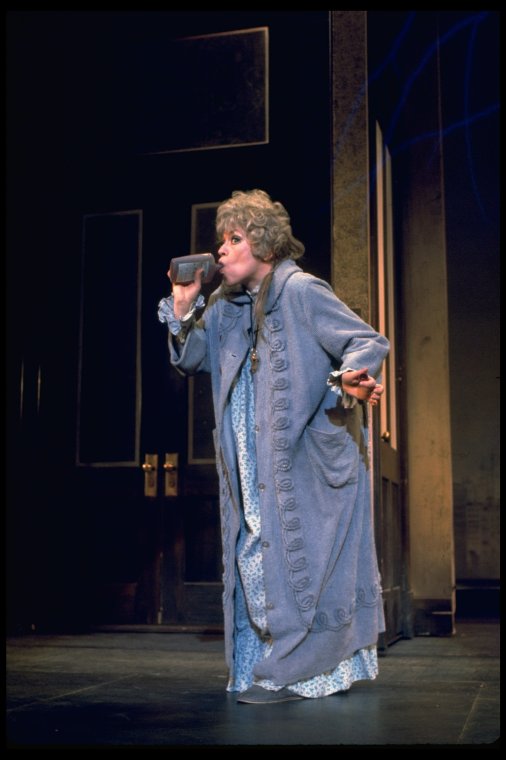
Like most Broadway musicals, Annie underwent extensive tinkering during rehearsals. At first Miss Hannigan had an Irish accent. Nichols eliminated it, but the brogue occasionally crept back into Loudon's performance well into the show's run. There were also extensive dialogue revisions. "The part was literally written on my feet," said Loudon, who was never shy about taking credit for her own contributions to the character. Specifically, she laid claim to coming up with the whistle, the whiskey, and the radio, as well as the famous lines "Do I hear happiness in here?" and "Why any kid would want to be an orphan, I'll never know."
(An actor's claim to have made up her own best gags might typically be met with skepticism, but Loudon's surviving correspondence displays an arch, economical wit, and both of those lines are indeed scribbled in Loudon's handwriting in her rehearsal script.)
Charnin and company were supportive of Loudon's improvisations — up to a point. "Marty Charnin . . . was wonderful," Loudon told a reporter. "When I went too far, he'd tell me, but mostly he left me alone." Later, after she had left the production, Loudon was more critical, claiming that during previews the producers wanted to cut "Easy Street," because her role had grown too large and the number threatened to stop the show. "I made a very unimpassioned plea," Loudon recalled. "I said, 'This is not Chekhov. It goes and I go.'" It stayed.
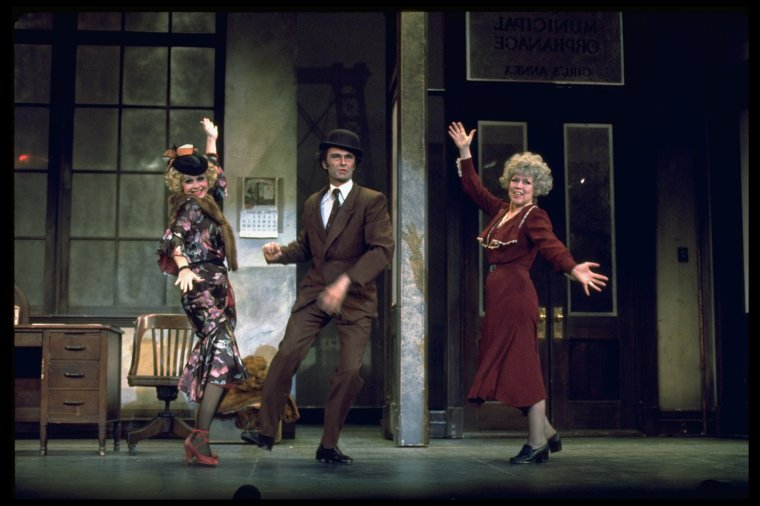
Almost without exception, Loudon received the best notices for a show that was itself generally well-reviewed. David Richards in The Washington Star: "The rage she gets out of a single frozen stare is worthy of Medea on the ramparts." Clive Barnes in The New York Times: "Loudon is ... deliciously and deliriously horrid. She never puts a sneer, a leer or even a scream in the wrong place, and her singing has just the right brassy bounce to it." Jack Kroll in Newsweek. "Loudon raises mugging to a high art — she mugs with her face, her voice, her body — I swear she mugs with her very mind. Her bashingly funny performance tells the audience that it's all really a gag." Even the curmudgeons who dissented on the show thought that Loudon was the one right thing about it. Gordon Rogoff, in The Saturday Review, compared her to Ethel Merman.
Reading the reviews now, one gets the sense that Loudon's performance may have been the tipping point for a show that was exactly what New York theatre critics were primed to hate — an unpretentious and unapologetically optimistic and crowd-pleaser. "Loudon laces the sentiment with a healthy dose of nastiness," wrote Martin Gottfried in The New York Post. "Miss Loudon provides Annie with just that comic tone and balance it needs to keep things from getting maudlin," echoed Alvin Klein of WNYC. By winking at the audience, Loudon gave hard-bitten critics (and audiences) permission to like a show that was saccharine instead of cynical.
The accolades for Annie were many: Loudon received Outer Critics Circle and Drama Desk Awards, a caricature on the wall of Sardi's, and fan letters from the likes of Agnes de Mille and Eugenie Leontovich. But the big one was, of course, the Tony. Loudon was nominated as Best Leading Actress in a Musical — a surprise to some observers, who considered Miss Hannigan a supporting role, albeit a showy one. (Her Drama Desk citation was in the "featured" category.) Loudon was also competing against Annie herself, Andrea McArdle, which meant that the two performers could split the vote among the show's champions. In the Post, Martin Gottfried predicted that both would lose to Clamma Dale, star of the Porgy and Bess revival. Even Loudon agreed that Dale was likely to win.
Of course, that's not how it worked out. From the stage, an exhilarated Loudon charmed the audience (and viewers of the Tonys telecast) with a frank, witty acceptance speech. "Talk about survival!" she exclaimed, acknowledging her long climb to victory. "I'm so glad I bought this dress!" Loudon held up the award next to her shiny frock and added: "It matches!"
The 1977 Tony Awards were handed out on June 5. Loudon's date was her husband, Norman Paris, whom she credited from the stage with believing that she could create something special in Annie before she herself did. In the telecast of the awards ceremony, Paris can be seen standing and mouthing "I love you" to his wife as she walks to the stage. Less than a month later, Norman Paris suffered a crippling stroke and fell into a coma from which he never emerged. He died on July 10. Loudon soldiered on in Annie, missing only two performances. "It wasn't so much that she show had to go on, it just gave me some place to go," she said later.
Miss Hannigan existed in the form of Dorothy Loudon for a total of fifteen months. When Loudon left in the summer of 1978 to go into Ballroom, Alice Ghostley replaced her, followed during Annie's six-year run by Dolores Wilson, Betty Hutton, Marcia Lewis, and June Havoc. Most got respectable reviews, but everyone agreed: none of them was Dorothy Loudon. A Liz Smith column, best taken with a grain of salt, asserted that Loudon didn't actually watch Annie from the audience until December of 1979 — and did so standing up, because Annie was still an impossible ticket to get.
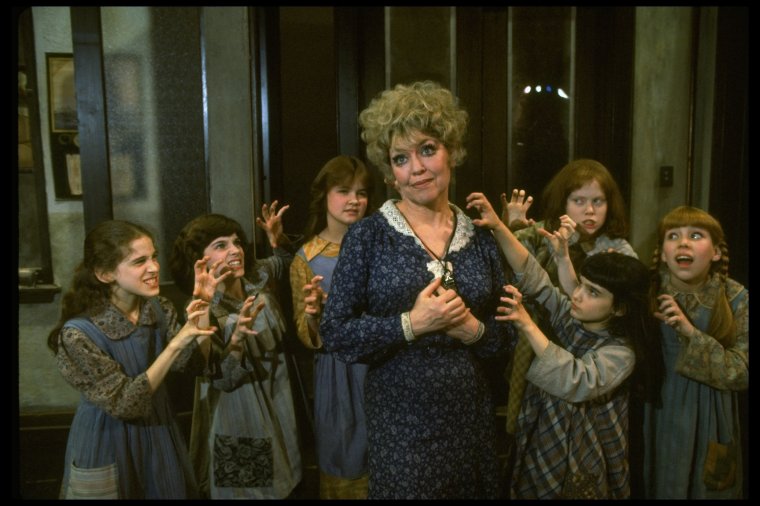
Along with Martin Charnin's Annie: A Theatre Memoir (E.P. Dutton, 1977) and Charles Strouse's Put on a Happy Face: A Broadway Memoir (Union Square Press, 2008), this piece was sourced entirely from the Dorothy Loudon Papers at the New York Public Library for the Performing Arts.
Along with her correspondence, quotes from Loudon are taken from the following articles, all collected in Loudon's scrapbooks: Richard Lee, "Washington surrenders to a musical," New York Post, April 2, 1977; Thomas Meehan, "On Making Little Orphan Annie Sing and Dance," New York Times, April 17, 1977; Robert Wahls, "A starlet suitable for Sardi's framing," New York Daily News, April 17, 1977; Cliff Jahr, "What Makes 'Annie' Run?," Village Voice, April 25, 1977; Judy Klemesrud, "Annie Hates Her, Audiences Love Her," New York Times, April 28, 1977; Jo Ann Levine, "Broadway's favorite ogress," Christian Science Monitor, June 17, 1977; Gerrit Henry "Dorothy Loudon: 'Talk about survival!'" After Dark, October 1977; Kevin Kelly, "How a saloon gal won her Tony," Boston Globe, October 2, 1977; William Raidy, "Loudon loves her hated role," The Star-Ledger, November 20, 1977; Glenna Syse, "Dorothy Loudon a nobody who's somebody special," Chicago Sun-Times, May 16, 1982; Hap Erstein, "Dorothy Loudon's life on stage no 'Easy Street,'" Washington Post, November 2, 1983.
Read E-Books with SimplyE
 With your library card, it's easier than ever to choose from more than 300,000 e-books on SimplyE, The New York Public Library's free e-reader app. Gain access to digital resources for all ages, including e-books, audiobooks, databases, and more.
With your library card, it's easier than ever to choose from more than 300,000 e-books on SimplyE, The New York Public Library's free e-reader app. Gain access to digital resources for all ages, including e-books, audiobooks, databases, and more.
If you don’t have an NYPL library card, New York State residents can apply for a digital card online or through SimplyE (available on the App Store or Google Play).
Need more help? Read our guide to using SimplyE.
Comments
Dorothy louden memories
Submitted by Kimberly Hurst (not verified) on December 30, 2015 - 3:52pm